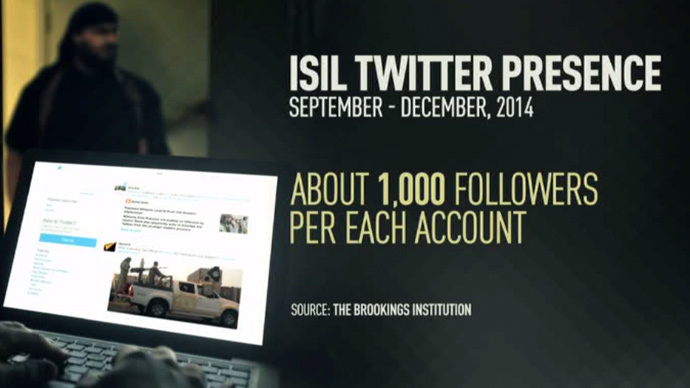‘Somebody has got to oppose them’: Anti-ISIS hackers to RT
The international war effort against the Islamic State has been bearing little fruit, as the group now threatens to turn Gaza into another one of its strongholds. RT spoke with a representative of hacker groups credited with a monumental anti-ISIS effort.
The hacker collective, known as Ghost Security – or GhostSec has combined forces with two other groups – CtrlSec and the famous Anonymous, to stem the tide of online extremism and save lives by getting everyone involved, as well as passing sensitive information on directly to the appropriate authorities. During the six-month-old effort, the combined collective has earned some massive praise from all the relevant people.
READ MORE: '100 killed' in ISIS attacks on Egyptian checkpoints in Sinai
The Islamic State (IS/ISIS/ISIL) has been enjoying a large Twitter presence – with some 46,000 accounts run, mostly, by supporters in Syria and Iraq, according to the Brookings Institution; but hackers the world over have been waging their own battle against the extremists.
RT spoke with a person going by Mikro, who represents GhostSec and CtrlSec.
“We have taken offline over 100 websites and suspended over 55,000 Twitter accounts,” the hooded spokesman said over Skype. Some are having to be shut two-three times a day, he says. “We are literally stalking” those accounts.
“Earlier we had disrupted their network, who were helping them from Turkey and over to Syria, to participate. They got arrested, and some of them got killed in riots,” he continued. “Fan boys are having a significantly bigger problem contacting each other, knowing that we’ve disrupted their main communications.”
“We are getting reports from everywhere that we are helping a lot, so I think… we have done more than we actually are aware of ourselves.”

And authorities appear to have great use for the hackers beyond their skill set of just hacking or taking things offline. Whenever there are signs human lives might be in danger, “we are contacting the ones who can actually prevent something.”
Mikro adds that online discussions between IS members often include bomb-making instructions, and that high positions in the terrorist organization often have to do with how much money a member has.
READ MORE: ISIS beheads female civilians for the first time - monitor
The group also set up an online option on the GhostSec website for submitting any information that may be of use to them in their campaign. “If we are able to save a life… then those six months we have been doing this for one life is worth it.
"Everybody can do something. You don’t have to pick up a gun to do something to prevent this,” Mikro says. “Public effort really matters… that’s important.”
The hackers also told RT of their own view on the IS, as seen from the footage that does not make it to your television set.
“We are watching pictures of what they are doing, the things you are hearing about in the news… we see that. The news you see has been censored, and we see these things raw. They are using a lot of violence in their propaganda,” the hackers’ representative continued.
“It is putting us in the position where we are forced to watch what they are doing. It’s devastating, seriously. It’s psychologically devastating to see what they’re doing, but somebody has got to oppose them.”
But the anti-ISIS online effort has an evil twin – pro-ISIS hackers have been issuing threats of war on the nations outspoken in their attitudes toward the terrorist group.
Pro-ISIS hackers threaten US, Europe, Australia with 'electronic war' http://t.co/u0JcB90Ir5pic.twitter.com/LKatm4IjOz
— RT America (@RT_America) 13 мая 2015
A late May video was released promising to wage war against the US, Europe and Australia. The group, calling itself 'Islamic State's Defenders in the Internet' alleges that it’s already hacked websites belonging to “the American leadership”, an Australian airport and “others.”
Just as in the case with Ghost Security, the video shows a hooded and anonymous figure speaking in a masked voice, but in Arabic, with subtitles. It remains unclear if the group is a true affiliate of the Islamist group, or just fans. The video was not traced back to any official IS media accounts.

And yet, the newly-formed hacker conglomerate is not the only civilian force out there trying to make a difference. RT recently spoke to a private contractor from the US, who decided to head to the Philippines after local jihadists began pledging allegiance to the IS.
“They’re hurting kids, they’re hurting innocent people, and they’re saying it’s in the name of Islam. It doesn’t work that way,” Suleiman Yousef told RT. “There’s always a bigger and badder person, and right now we’re going to be that bigger and badder person…”












